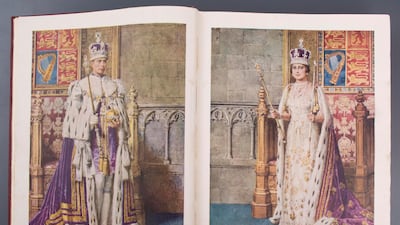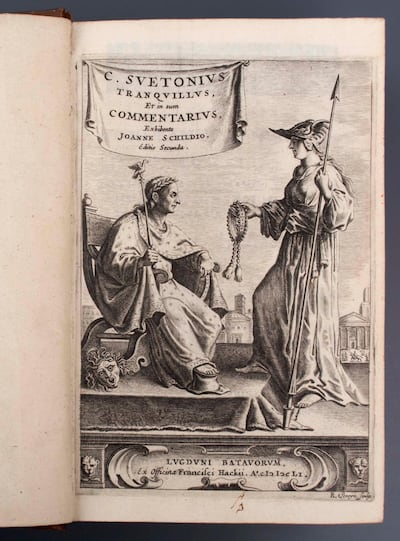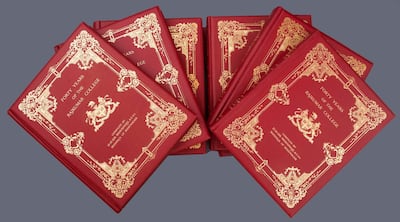A View of Death or The Soul's Departure from the World is a philosophical poem written in 1725. John Reynolds, a clergyman of the time, penned musings about life and death in this prose, with one brilliant addition – he provided footnotes detailing several scientific discoveries, which could explain phenomena such as why death turns the human body cold, or why hearing is the last cognitive ability a dying person possesses.
"Even on the brink of death, people can hear what is happening around them, including unpleasant relatives," says Sunil Baboo, the proud owner of the book – though not for long.
The resident of Bengaluru in India is a prolific artefacts collector and is auctioning off a part of his collection of rare books, catalogues, documents and maps, some dated as far back as the 17th century.
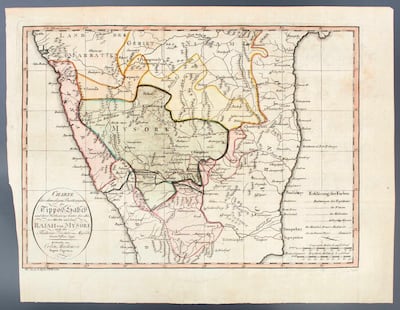
The oldest book across the 60 lots up for auction is De Vita Caesarum, originally written in 121. Commonly known as The Twelve Caesars, it is a set of biographies written in Latin on the Roman emperors including Julius Caesar, Augustus and Titus. Baboo's edition is dated 1605.
Bids will open online today at Prinseps, the virtual auction house helmed by art enthusiast Indrajit Chatterjee. While the starting bid for De Vita Caesarum is a paltry 50,000 Indian rupees (Dh2,600), it is estimated to go for three or four times that – at least.
Collecting runs in Baboo's family
It seems almost counterintuitive that a lifelong rare book collector would part with treasures acquired over four-odd decades. But Baboo is ready to hand over the baton to the next generation of collectors and bibliophiles, who could build greater collections and bring the spotlight to moments in history that are otherwise diluted or erased in contemporary writings.
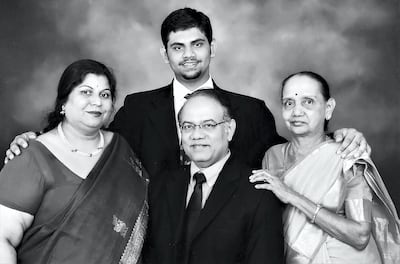
“I’ve always been driven by insatiable curiosity,” the sexagenarian says. “I want to know what actually transpired, because later books tend to imbibe the perception of the writer instead of presenting the whole picture objectively.”
Baboo has dabbled in many professions, ultimately retiring as an apparel exporter in 2013. He then travelled around the world with his wife Alpana, and today, they live between Bengaluru and France. Collecting runs in the family – Baboo's son is a winemaker and collector of rare wines, and many of Baboo's books are also carefully stored at their European residence. In total, Baboo owns more than 150 rare tomes, manuscripts and documents, as well as a tiny collection of bank notes and art.
With a steady network of dealers around the world, Baboo's compilation remains essentially India-centric, particularly ranging from the 1700s to the mid-1900s.
Priceless artefacts are going under the hammer
At the Prinseps's auction you will find books on the mutiny of 1857 (India's first war of independence), Lord Mountbatten and Tipu Sultan – ruler of Mysore and one of Indian history's best-known warriors – and the wars he fought against the British East India Company. There are a lot of works dedicated to India's wildlife and shikar (hunting) culture too. Although the most exquisite (and expensive) item appears to be the first edition of six volumes of The Works of Sir William Jones, published in 1799. Unfortunately, this is one of the few items at this auction not allowed to export from India, which is otherwise open to global bidders.
For such a versatile collector though, the question arises – is a collection made up of a few hundred book too limited? Baboo laughs and says, "One must be careful to not turn their homes into a bookshop."
More seriously, says Baboo, it is important to focus on quality rather than quantity – every rare item must be cherished and valued, rather than hastily acquired and then left to gather dust. This is a problem in some parts of India.
“There is no order nor care taken of books, manuscripts or documents by sellers here. Most people don’t even know what they’re giving away because it’s inherited, and even if they understand its value, there is no maintenance nor preservation techniques used to keep them free of insects.”
What next for the prolific collector?
With the proceeds from the Rare Book Auction, Baboo plans to kick off his next venture, Rent-A-Art. The idea is to buy artworks from small towns and rural artists across the country (and the wider subcontinent) and rent them out to companies and institutions at a nominal charge for a month, which will be paid to the artists. Not only is this geared towards uplifting regional artists, who find it hard to make ends meet due to lack of infrastructure, grants and a solid dealer-curator network, but it is also meant to make art a part of everyday life in India.
“In migrating to bigger towns and cities for sustainable livelihoods, traditional and tribal artists simply forget their talent,” says Baboo. “Our business model is meant to add a certain consistency to an artist’s life. We also want to take native Indian art to the West – because no one knows of these genres, they never become mainstream. We want to bridge the gap.”
On schedule to launch in December, Baboo and Alpana already have a roster of more than 100 paintings – landscapes, still life, portraits, etc – to rent out. The couple also wants to highlight tribal forms such as Sohrai and Khovar from Hazaribagh, Gond art as well as painters such as NB Gurung from Nepal, whose portraits, in particular, Baboo admires greatly.
“To appreciate art, you don’t need money,” he says. “And rural and tribal art are very appealing, especially as we live in concrete jungles and are often deprived of soothing naturescapes in the course of everyday life. The general public must engage with these artists.”
Does that mean Baboo’s days as a rare book collector are over? “Not at all.” he says. “I want to now refocus my attention on other collectables.” On top of his list are books on Islamic art, architecture and design.
For now, however, it is the pending auction that is taking up his attention. The highest opening bid at 725,000 rupees is for the Jones's volumes. There are other priceless gems such as The Lusiad, Or, The Discovery of India, a poem translated from Portuguese and describing Vasco de Gama's journey to India. There is also the Memoirs of Zehir-Ed-Din Muhammad Baber, originally Baburnama, an autobiography written in a language called Turki by Babur, the founder of the Mughal Empire in India. The book on auction is the first edition of an English translation published in 1826.
The Prinseps Rare Book Auction will be live on September 4 and 5 from 10am on www.prinseps.com. Some of the items are not exportable outside India
